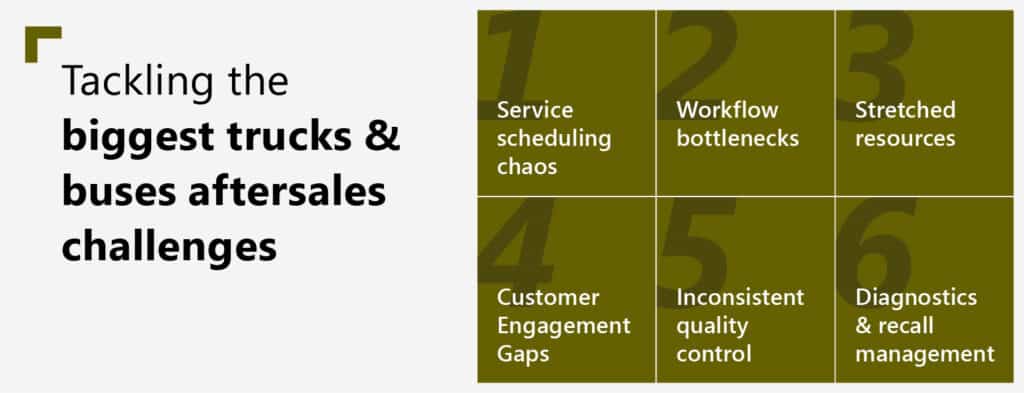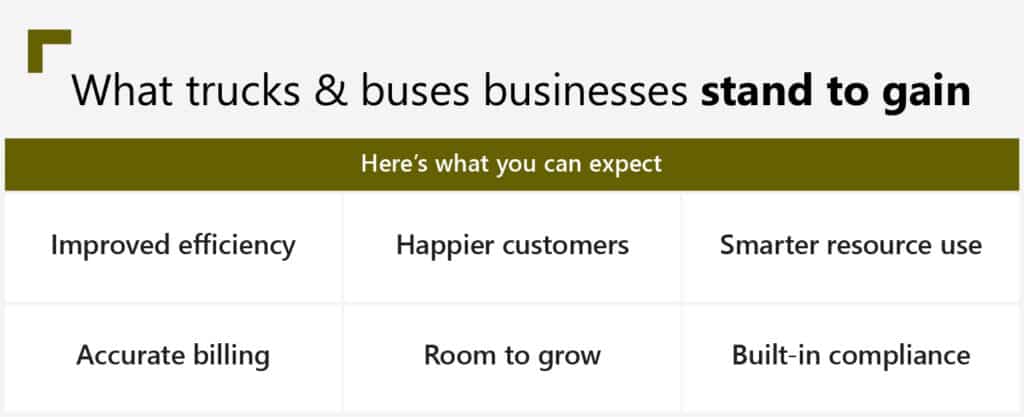Trucks & buses aftersales isn’t just a support function. It’s a critical driver of customer loyalty, operational uptime, and long-term profitability. Whether you’re managing a single workshop or a multi-location service network, you’re likely facing familiar frustrations: last-minute schedule changes, underutilized technicians, parts that aren’t where they need to be, and customers who just want clear answers and fast fixes.
If you’re facing any of the above, you’re not alone.
The aftersales experience for commercial vehicle businesses is more demanding than ever. Customers expect quicker turnaround, clear communication, and consistent service quality. Internally, you’re juggling tight margins, resource constraints, and increasing complexity from newer vehicle technologies.
It’s no longer enough to just “keep things running.” You need a trucks & buses aftersales solution that helps you work smarter, faster, and more efficiently.
Tackling the biggest trucks & buses aftersales challenges

1. Service scheduling chaos
Trying to book a vehicle for service during peak periods can feel like playing Tetris with broken pieces. Uncoordinated bookings lead to overcrowded bays or underused resources, and both eat into profitability. More importantly, poorly scheduled service appointments frustrate customers who depend on uptime.
2. Workflow bottlenecks
From vehicle check-in to diagnosis to repair and sign-off, too many service centers rely on outdated processes or disconnected systems. That results in lost paperwork, poor communication between departments, and, ultimately, delays that cost time and money.
3. Stretched resources
How many times have your service advisors been double-booked, or mechanics been assigned jobs without the right parts in stock? In an industry where every minute matters, poor resource allocation leads to overtime costs, burnout, and missed service targets.
4. Customer engagement gaps
You can have the best technicians in the world but if your customers feel left in the dark about service progress, costs, or outcomes, their trust erodes. And in this industry, trust equals loyalty.
5. Inconsistent quality control
Missed inspections, poor documentation, or misdiagnosed issues can result in repeat visits, and customers don’t forget that kind of thing.
6. Diagnostics & recall management
As vehicle systems get more advanced, so do their diagnostics. But if your team doesn’t have quick access to diagnostic data, or if recall handling is manual and reactive, you risk falling behind.
Meet A365: Built for the realities of trucks & buses aftersales
That’s where A365 steps in, not just as a platform, but as a partner in your growth. Built on Microsoft Dynamics 365, Azure, Copilot, Power Platform, and Dataverse, A365 is specifically designed to handle the scale, speed, and specificity of the trucks & buses industry. Whether you’re managing one workshop or a nationwide dealer network, A365 Trucks & Buses Aftersales gives you the tools to transform aftersales from a cost center into a strategic growth driver.
A365 Trucks & Buses Aftersales capabilities at a glance

- Workshop management: Streamline job flow with better visibility and planning
- Quality assurance: Built-in checks for every step of the job
- Job quotations: Transparent pricing with detailed breakdowns
- Resource allocation: Assign the right techs to the right jobs with smart tools
- Service appointments: Easy, automated scheduling for customers and staff
- Service reporting: Track performance and spot patterns over time
- Service orders: Digitally manage and track every job from start to finish
- Billing and invoicing: Accurate, customizable billing options
- Resource planning: Forecast needs and align staff and parts accordingly
- Workflow monitoring: See where work is getting stuck and fix it fast
Key features that set A365 Trucks & Buses Aftersales apart
Workshop and resource management
Integrated planning board: A visual, drag-and-drop interface for scheduling resources and assigning tasks. Enables workshop managers to balance workload efficiently.
Role-based processes: Tailored workflows for roles such as Service Advisor, Planner, and Mechanic to ensure efficient task execution.
AI-powered appointment scheduling: Use the A365 AI Agent to automate service appointment bookings, ensuring optimal resource allocation and reduced administrative workload.
Inventory and parts management
Live inventory tracking: Monitor parts availability and pre-pick status in real time to ensure readiness for service appointments.
Spare parts management: Simplify parts reservations and sourcing for faster repairs and maintenance.
Global parts and labor insights: Provide accurate data on parts and labor costs by vehicle model for precise pricing. \
Service execution and documentation
Detailed service records: Maintain full-service history, including media files and detailed documentation of causes and solutions.
Digital customer signatures: Capture digital approvals for job confirmations, improving traceability.
Compliance and traceability: Ensure all service activities meet industry standards and are auditable.
Customer interaction enhancements
Real-time service updates: Keep customers informed of job progress through notifications and dashboards.
Survey index: Collect customer feedback to improve service quality.
Advanced warranty and recall management
Warranty claims processing: Automate claims validation and processing for faster resolutions.
Recall management: Streamline recall handling to ensure safety compliance.
Warranty analytics: Gain insights into claim trends to identify recurring issues.
Preventive maintenance and asset reliability
Maintenance plans: Optimize preventive maintenance schedules to reduce downtime and extend vehicle lifespan.
IoT integration: Use real-time data from vehicles for proactive diagnostics and monitoring.
Streamlined billing and invoicing
Unified invoicing profiles: Create customized invoices for contracts, warranties, and multiple payers.
Accurate financial tracking: Ensure all labor, parts, and fees are properly accounted for with automated systems.
Margin check: Validate pricing accuracy to maintain profitability
Enhanced scalability and flexibility
Support for multi-site operations: Manage multiple service centers with centralized planning tools.
Adaptable workflows: Customize workflows to meet the specific needs of different locations or clients.
What trucks & buses businesses stand to gain
Implementing A365 Trucks & Buses Aftersales isn’t just about adding another tool. It’s about reshaping your aftersales operation into a well-oiled machine that drives satisfaction and profitability.

- Improved efficiency: Cut the clutter, eliminate delays, and focus on what matters.
- Happier customers: Faster turnarounds, clear communication, and consistent quality keep your customers coming back.
- Smarter resource Use: Assign the right people to the right jobs and use parts more efficiently.
- Accurate billing: No more missed line items or undercharged labor. You stay profitable and customers get clarity.
- Room to grow: A365 supports multi-location operations, adapting to your business as it expands.
- Built-in compliance: Keep detailed, auditable records for warranties, safety checks, and recalls.
Final thoughts
Trucks and buses businesses can’t afford to treat aftersales service as an afterthought. Downtime costs money, and poor service erodes trust. A365 Trucks & Buses Aftersales is designed with these realities in mind. It gives you the tools, visibility, and automation to turn your workshop from a reactive cost center into a strategic growth engine.
If your service teams are still relying on spreadsheets, phone calls, and guesswork to manage critical workflows, it might be time to explore what A365 Trucks & Buses Aftersales can do for you. Because when every hour of uptime counts, you need a system that works as hard as your vehicles do.
Ready to power new possibilities for your business with A365 Trucks & Buses Aftersales and Microsoft Dynamics 365? Let’s talk.

















